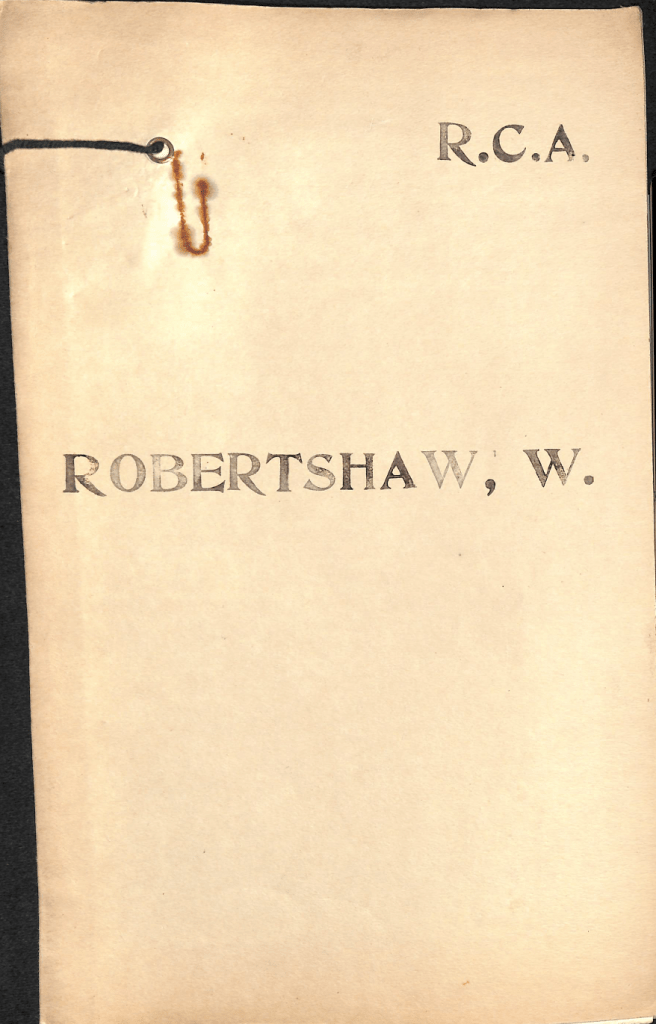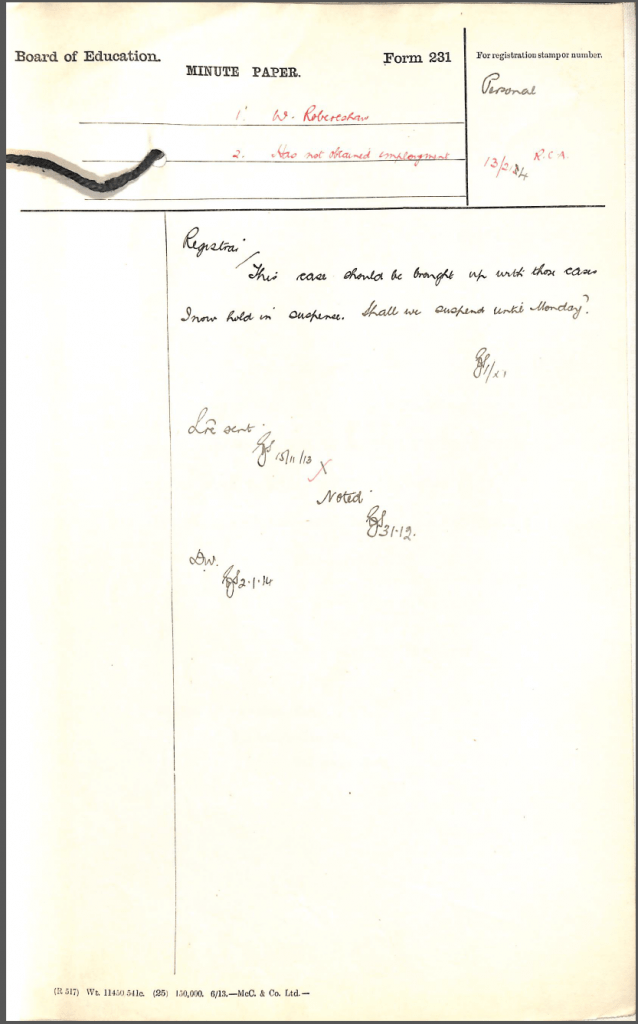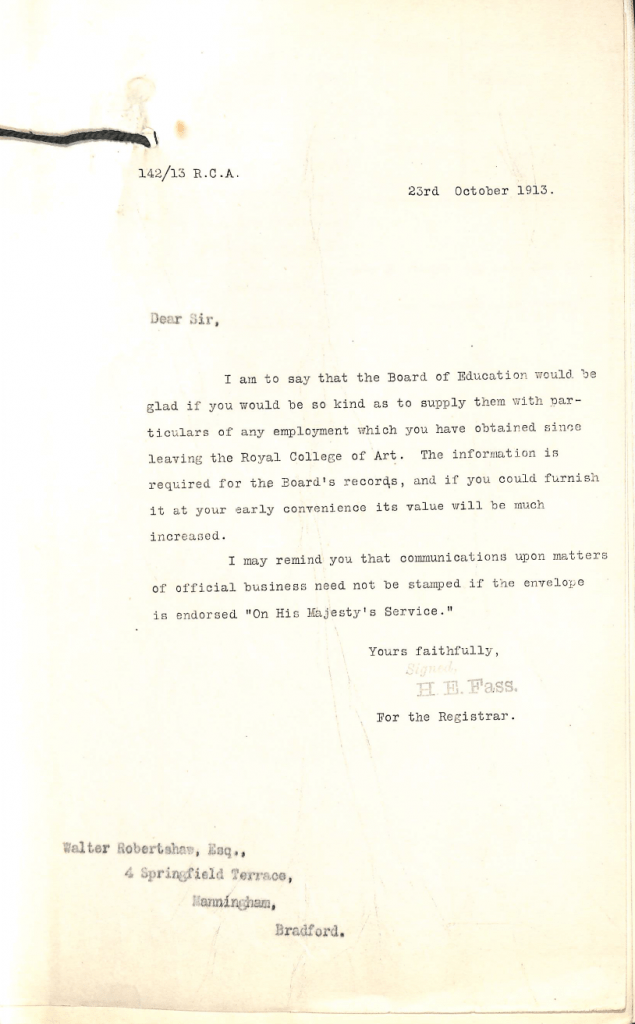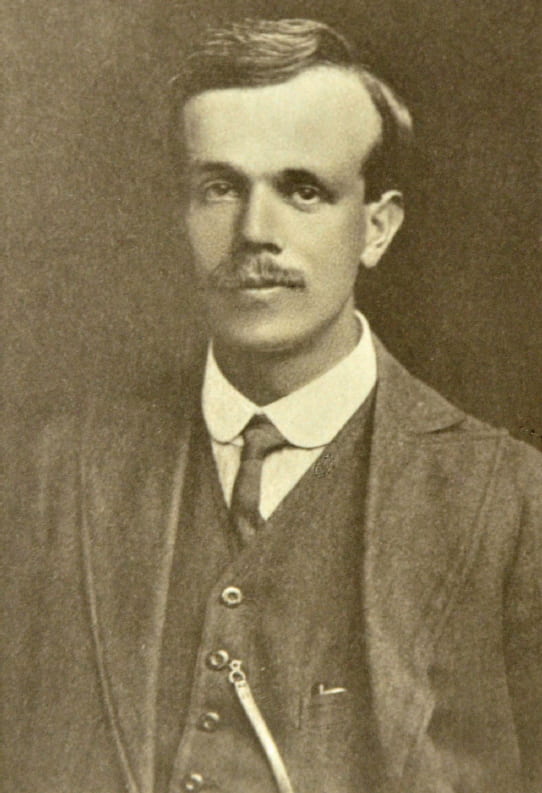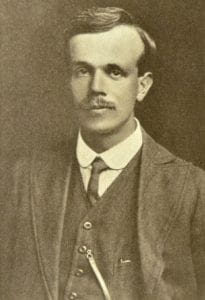
Born: 12 June 1886
Died: 12 October 1918
Studied at RCA: c.1908/9 – February 1913
Frustratingly, Walter’s RCA student file contains few papers. The usual official forms providing information about previous education, important dates, classes undertaken and marks awarded, have not been found. He was the middle son of three born to ‘print compositor’ Hillas Robertshaw and his wife Catherine (who died in their childhood), and grew up in Manningham, Bradford. Later sources note that he had been a pupil and then an ‘Art Students’ Assistant’ at Bradford Grammar School. At the time of the 1911 census both Walter and his newly married older brother, Joseph, were living in Mill Hill, London. Walter seems to have been studying at the College since 1908, while Joseph was working as a civil servant – an ‘Assistant Examiner’ at the Patents Office. Their younger brother, Frank – a clerk at a clothing manufacturer – continued to live with their widowed father in Yorkshire. Walter’s student file indicates that he later took lodgings nearer the College in Lilyville Road, Fulham – a road in which several other students lived.
It is not known why Walter left the College after he had completed nine terms rather than waiting until the end of the academic year. There is not even a record of his gaining a diploma after four years, the usual outcome of such a period. He did not, however, appear to leave because of a job offer: he responded to an enquiry sent by the College in October 1913 saying that he had ‘not obtained any employment since leaving’. A brief note in his student file in response to this suggests the College might have wanted to help him. Whether they did is not known, but at some point during the following couple of years Walter found work as an art master at Kidderminster School of Science and Art (also suggesting that he may have gained his qualification). There may be a tenuous connection between the school and the College: Frank Short, the College’s professor of engraving, came from nearby Stourbridge, the home of another government art school which he attended and that is, occasionally, linked in records to Kidderminster.
Calculations based on Walter’s war gratuity indicate that he joined the Worcester Regiment in June 1916, following the introduction of conscription a month before. He was probably still training in Britain when Frank, who had enlisted earlier in the year, was killed during the Battle of the Somme in October 1916.
With no surviving individual service record, Walter’s whereabouts is not known for the following year. It is possible that he may have departed for the Mediterranean towards the end of 1916, via Marseilles, on his way to join the 11th Battalion, Worcester Regiment, already serving as part of the 78th Infantry Brigade (26th Division) near Salonika (now Thessaloniki). The battalion’s war diary does not clarify when he might have arrived in, say, a contingent of reinforcements: that Walter did serve in Salonika is only known from later records, with an issue of the Bradford Weekly Telegraph (25 October 1918) noting while there ‘he was engaged on mapping and similar work at the headquarters of his battalion’.
This theatre of war is still considered to be something of a sideshow when compared to other fronts – although the role of the Balkan states in the build-up to and triggering of the war, across Europe and beyond, continues to interest. Perhaps the lack of knowledge about the Macedonian Front, in which the Allies, under French command, fought against the tenacious Bulgarian Army, as well as German forces, is a reflection of the difficulty of providing eye-catching headlines from so far away and when operational losses were far smaller than in France and Flanders.
While frequent skirmishes and occasional fierce battles, such as the Battle of Doiran (1917), resulted in serious casualties, the main reason for the loss of fighting strength on this front was due to the harsh conditions the troops faced in the hot, swampy environment of the summer months and the freezing cold of the winter, often living for months in tents or huts. The number of soldiers who succumbed to illness was, infamously, far greater than for those who died from wounds: the British Salonika Force (BSF) alone suffered over 160,000 cases of malaria (and reintroduced it to some areas of Britain on return home if they survived). The continuous battling of patients and medical staff against mosquito and flies was only partially effective – although the insights gained into bacteriology would benefit public health in the future.
The operational stalemate only changed in the region during the autumn of 1918 – seemingly almost out of the blue. Over the 18-19 September 1918 a second British attack on Doiran (along with Greek Divisions) went ahead in support of an operation undertaken by French and Serbian forces in the mountains east of Monastir. It is unclear whether Walter took part in this initially unsuccessful operation to dislodge Bulgarian forces. But the French and Serb soldiers were able to break through the lines and began moving north of Monastir. Action from the RAF soon after helped cause a decisive retreat of Bulgarian forces. Within days peace negotiations were held, followed quickly by the signing of an armistice that came into effect on the last day of the month.
Walter did not survive the sudden outbreak of peace: he became ill during the following couple of weeks. The 42nd General Hospital, one of several extensive tented hospitals in the region, specialised in diarrheal diseases. When Walter was admitted is not apparent from their otherwise detailed diary. The unusual entry for 12 October notes ‘a very sudden and severe storm occurred about 6 am today which blew down several store and duty tents and a hospital marquee […] Storm was followed by rain. Snow on top of Mount Olympus for the first time…’. On the 13 October Walter’s death is recorded and backdated to the previous day. He had ‘died at 6 am yesterday of Broncho-pneumonia and Dysentery Shiga’ – he was the second of four patients who had succumbed to this combination of illnesses over just two hours that morning – the time it took for the storm to arrive and pass over.
Walter left his effects to his brother, Joseph – his father had died in 1917. Walter was buried at Kirechkoi-Hortakoi Military Cemetery, Greece.
